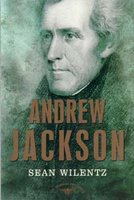
 Four authors and four presidents were spotlighted Wednesday, March 1, in a Smithson Associate’s program in Washington, D.C. The program, Presidents All, featured the following presidents and their biographers:
Four authors and four presidents were spotlighted Wednesday, March 1, in a Smithson Associate’s program in Washington, D.C. The program, Presidents All, featured the following presidents and their biographers:- Thomas Jefferson by Joyce Appleby, professor of history, UCLA
- James Monroe by Gary Hart, former U.S. Senator from Colorado
- Andrew Jackson by Sean Wilentz, professor of history, Princeton
- Benjamin Harrison by Charles W. Calhoun, professor of history, East Carolina State
Thomas Jefferson
Jefferson’s reputation has gone up and down through the years, Appleby said. It’s currently at a low, just as it was prior to the Civil War and again late in the 19th Century. Jefferson’s reputation was at a high under FDR, she said, because Roosevelt and his advisors decided to make Jefferson the founder of the Democrat Party.
As the Civil Rights movement gathered strength, Jefferson’s reputation began to ebb. Appleby said inquiries into Jefferson as a slaveholder, as the father of a child by a slave and as a man who kept his progeny in slavery served to damage his reputation. Although other Founding Fathers also kept slaves, Jefferson’s reputation was especially damaged because he raised our expectations with his affirmation of human rights, Appleby said.
James Monroe
Monroe was first and foremost a solider, according to Hart. The former Senator said Monroe’s outlook on his role as a public servant was conditioned by his military service. Hart also said that Monroe had a preoccupation with what we today call national security. Monroe was aggressive in securing U.S. borders.
Hart also said Monroe had a lengthy career as a diplomat, but that it was largely unsuccessful.
Andrew Jackson
Wilentz noted that Arthur Schlesinger Jr., general editor of the series, is the author of the definitive biography on Jackson. He said that being asked to write about Jackson by Schlesinger was like being asked to write about baseball by Babe Ruth.
Jackson thought of himself as a Jeffersonian, Wilentz said, but Jefferson was horrified that a military man, like Jackson, had become president. Jackson’s reputation peaked in the 40s and has since declined largely because of his policies on the American Indian. “He became known for one thing and one thing only,” Wilentz said, “Killing lots of Indians. He is remembered for his greatest failure.”
Wilentz described Jackson as a “strange guy” and the first “perfect nobody” to become president. He said Jackson was truly a self-made man whose politics were simple: He hated the British and aristocracy and believed fervently in the U.S. Constitution.
Benjamin Harrison
Unlike Jefferson and Jackson, whose reputations have gone up and down, Harrison’s reputation has remained steady, said Calhoun. He has always been lightly regarded. “He is often regarded as a caretaker between Grover Cleveland’s two terms. The truth is more complex.”
Harrison, who came into office at a time that the presidency had been diminished because of the impeachment of Andrew Johnson, made significant contributions to the office. Calhoun said those contributions included his effectiveness as a communicator and as a “legislative president.” Unlike previous presidents, who took the separation of powers seriously, Harrison promoted issues, and legislation, that he thought was important, including Civil Rights legislation. Harrison was also active in foreign affairs because of the illness of his Secretary of State James G. Blaine.
McKinley is generally regarded as the first "modern" president. Calhoun suggested that designation truly belongs to Harrison. He said both McKinley and Cleveland, in his second term, learned from Harrison.
American Presidents series
The American Presidents series comes highly recommended. It takes the Penguin Lives approach to biography – bite-sized biographies, usually no more than 200 pages in length. The emphasis in each book is on the individual’s presidency. The series is well written and impeccably researched.


No comments:
Post a Comment